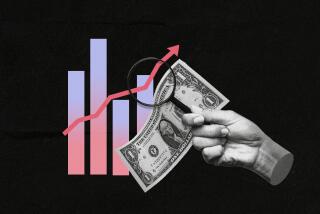Study Doubts Gains in Family Buying Power
- Share via
WASHINGTON — Although the average two-parent family in 1988 had slightly higher earnings than in 1978 after adjusting for inflation, some of the increase was offset by added work expenses resulting from more mothers being employed, leaving the family little better off in purchasing power than a decade earlier.
That’s the thesis of a research paper issued this week by the House Democratic Study Group.
The study says that because of various economic changes, including more foreign competition and the failure of American business to take the lead in new products, wages in the United States fell from $11.27 to $10.13 an hour (after adjusting for inflation) from 1978 to 1988.
This meant a “decline in the paychecks of (the) principal breadwinner,” the husband in the traditional family, who had been able to support his family on his paycheck.
The falling wages threatened to produce a serious decline in family living standards, according to the study, but the income loss was made up by more mothers entering the labor force, bringing an extra paycheck into the home.
Of the 25 million to 26 million mothers in two-parent families, 14.7 million worked outside the home in 1978, jumping to 18.1 million by 1988.
The study attempted to determine how much better off families were because more mothers worked. The study focused on results for the average two-parent family, factoring in mothers who worked full time or part time, and the 6 million to 7 million mothers who were not employed outside the home.
It found that although the average earnings of the 25 million to 26 million fathers in two-parent families were falling from $31,973 to $30,766 from 1978 to 1988 (measured in constant 1990 dollars), average earnings of the 25 million to 26 million mothers rose about $3,500--to $9,945--because more them were working, and working more hours.
As a result, combined family earnings rose from $38,439 to $40,711.
The study found that for middle-income, two-parent families, added work expenses for a family’s second earner could average almost $2,000 a year, plus taxes. Work expenses include transportation, child care, clothes and meals.
More to Read
Inside the business of entertainment
The Wide Shot brings you news, analysis and insights on everything from streaming wars to production — and what it all means for the future.
You may occasionally receive promotional content from the Los Angeles Times.










